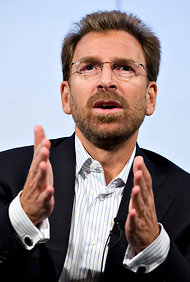 Mark Lennihan/Associated PressEdgar M. Bronfman Jr. in 2007
Mark Lennihan/Associated PressEdgar M. Bronfman Jr. in 2007
4:15 p.m. | Updated Edgar M. Bronfman Jr., who has been a major player in the music industry since the mid-1990s, is stepping down as chairman of the board of the Warner Music Group, effective Jan. 31.
Mr. Bronfman will remain a board director, but he told employees in an internal memo that his “other obligations are beginning to take an inordinate amount of time.”
In the music industry there had been widespread expectation that Mr. Bronfman, 56, would be leaving the company soon. Warner was sold to Access Industries in May for $3.3 billion, and last month Warner lost a bid to acquire EMI, a long-sought goal of Mr. Bronfman’s.
EMI, the home of the Beatles, the Beach Boys and Pink Floyd, was instead sold for a total of $4.1 billion in a two-part deal that divided the company between Sony and the Universal Music Group, a division of the French conglomerate Vivendi. Warner has made several attempts to merge with EMI over the last decade.
The company is expected to name a new chairman by January.
The news of Mr. Bronfman’s departure was first reported by The New York Post. A Warner Music spokesman declined to comment.
An heir to the Seagram fortune, Mr. Bronfman has had a mixed career as a media mogul. Through a series of multibillion-dollar deals beginning in 1995, he created the Universal Music Group, still the world’s largest music company. In 2000, he sold Seagram to Vivendi for $34 billion in stock, which plummeted in value after Vivendi made a series of acquisitions that nearly bankrupted it.
Mr. Bronfman stepped down from Vivendi in 2001, but in 2004 he led a team of investors that bought Warner Music from Time Warner for $2.6 billion and took the company public the following year.
As Warner’s chief executive, Mr. Bronfman pushed to develop its digital music business as well as its so-called 360 contracts, which let the company make money on its artists’ tours, merchandise sales and other areas in addition to record sales.
In August, he stepped down as chief executive to become chairman of the board and focus on an EMI deal. Stephen F. Cooper, a turnaround expert who had previously worked at the Enron Corporation and Krispy Kreme Doughnuts, took over as chief executive in August.
In another memo to Warner employees on Monday, Len Blavatnik, the head of Access Industries, praised Mr. Bronfman’s stewardship of the company.
“It was his vision in transforming W.M.G. into a progressive, modern music company that made W.M.G. so attractive to Access,” Mr. Blavatnik wrote. “Given that vision and his years of expertise in the industry, as a director at W.M.G., he will continue to be an important part of our leadership and I look forward to his many future contributions.”
The music industry has suffered punishing losses over the last decade, and many in the music industry were surprised that Mr. Bronfman was able to sell Warner this year at a higher price than his investor group had paid seven years ago. But some analysts have been critical that Warner did not turn out to be a good deal for public investors. The company set the stock price for its initial offering at $17, and it was sold to Access for $8.25 per share.
“The transaction worked out very well if you look at the Warner Music Group as private equity investment,” said Richard Greenfield, an analyst at BTIG. “It worked out well for the original, pre-I.P.O. investors. But it never worked out as well in the public markets.”
Article source: http://feeds.nytimes.com/click.phdo?i=9cef26fabe66e9f3bb4539f89b8f60e7
Speak Your Mind
You must be logged in to post a comment.